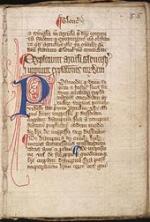To all free men of our kingdom we have also granted, for us and our heirs for ever, all the liberties written out below, to have and to keep for them and their heirs, of us and our heirs:
(2) If any earl, baron, or other person that holds lands directly of the Crown, for military service, shall die, and at his death his heir shall be of full age and owe a `relief’, the heir shall have his inheritance on payment of the ancient scale of `relief’. That is to say, the heir or heirs of an earl shall pay 100 for the entire earl’s barony, the heir or heirs of a knight l00s. at most for the entire knight’s `fee’, and any man that owes less shall pay less, in accordance with the ancient usage of `fees’
(3) But if the heir of such a person is under age and a ward, when he comes of age he shall have his inheritance without `relief’ or fine.
(4) The guardian of the land of an heir who is under age shall take from it only reasonable revenues, customary dues, and feudal services. He shall do this without destruction or damage to men or property. If we have given the guardianship of the land to a sheriff, or to any person answerable to us for the revenues, and he commits destruction or damage, we will exact compensation from him, and the land shall be entrusted to two worthy and prudent men of the same `fee’, who shall be answerable to us for the revenues, or to the person to whom we have assigned them. If we have given or sold to anyone the guardianship of such land, and he causes destruction or damage, he shall lose the guardianship of it, and it shall be handed over to two worthy and prudent men of the same `fee’, who shall be similarly answerable to us.
(5) For so long as a guardian has guardianship of such land, he shall maintain the houses, parks, fish preserves, ponds, mills, and everything else pertaining to it, from the revenues of the land itself. When the heir comes of age, he shall restore the whole land to him, stocked with plough teams and such implements of husbandry as the season demands and the revenues from the land can reasonably bear.
(6) Heirs may be given in marriage, but not to someone of lower social standing. Before a marriage takes place, it shall be’ made known to the heir’s next-of-kin.
(7) At her husband’s death, a widow may have her marriage portion and inheritance at once and without trouble. She shall pay nothing for her dower, marriage portion, or any inheritance that she and her husband held jointly on the day of his death. She may remain in her husband’s house for forty days after his death, and within this period her dower shall be assigned to her.
(8) No widow shall be compelled to marry, so long as she wishes to remain without a husband. But she must give security that she will not marry without royal consent, if she holds her lands of the Crown, or without the consent of whatever other lord she may hold them of.




